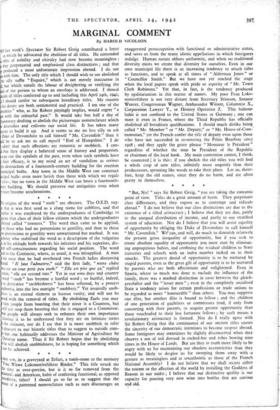e origins of the word " snob " are obscure.
The O.E.D. sug- that it was first used as a slang name for cobblers, and that ter it was employed by the undergraduates of Cambridge to ate that class of their fellow citizens which the undergraduates Oxford called " townees." The word then came to be applied, to those who had no pretensions to gentility, and then to those pretensions to gentility were unwarranted but marked. It was eray who stabilised the word as a description of the vulgarian in his attitude both towards his inferiors and his superiors, dis- self-consciousness regarding his social position. The word to the Continent, where, as usual, it was misapplied. A man tne once that he had overheard two French ladies discussing tend. " Il faut Padmettre," said the first lady, "noire chire est un tout petit peu snob." "Elie est Aire que ca," replied other, " elle est second rate." Yet in our own days and country word " snob " has become a hurtful word ; so hurtful, indeed, in derivative " snobbishness " has been softened, by a process phemia, into the less outright "snobbery." Yet assuredly snob- ess is an eternal element m human vanity, and will not be ed with the removal of titles. By abolishing Earls you may vain people from boasting that their niece is a Countess, but will not stop them boasting that she is engaged to a Commissar. people will always seek to enhance their own importance allowing it to be understood that they are on intimate terms the eminent, nor do I see that it is more snobbish to refer Pleasure to our historic titles than to suggest to outside corn- that one habitually addresses the Minister of Agriculture by Christian name. Thus if Sir Robert hopes that by abolishing he will abolish snobbishness, he is hoping for something which Dot be achieved.
* * * *






















 Previous page
Previous page